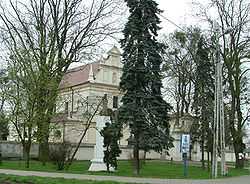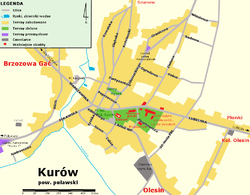Kurów
| Kurów | ||
|---|---|---|
| Village | ||
 | ||
| ||
 | ||
 Kurów | ||
| Coordinates: 51°24′N 22°11′E / 51.400°N 22.183°E | ||
| Country |
| |
| Voivodeship | Lublin | |
| County | Puławy | |
| Gmina | Kurów | |
| Established | probably 12th century | |
| City rights | 1442-1870 | |
| Government | ||
| • Mayor | Jan Łubek | |
| Area | 11.33 km2 (4.37 sq mi) | |
| Elevation | 157 m (515 ft) | |
| Population (31.12.2011) | 2,858 | |
| • Density | 252/km2 (650/sq mi) | |
| Time zone | CET (UTC+1) | |
| • Summer (DST) | CEST (UTC+2) | |
| Postal code | 24-170 | |
| Area code(s) | +48 81 | |
| Car plates | LPU | |
Kurów [ˈkuruf] (![]() ) is a village in south-eastern Poland, located in the historic province of Lesser Poland, between Puławy and Lublin, on the Kurówka River. It is capital of a separate gmina (municipality) called Gmina Kurów, within Lublin Voivodeship. The village has 2858 inhabitants (as of 2011).
) is a village in south-eastern Poland, located in the historic province of Lesser Poland, between Puławy and Lublin, on the Kurówka River. It is capital of a separate gmina (municipality) called Gmina Kurów, within Lublin Voivodeship. The village has 2858 inhabitants (as of 2011).
History
Kurów was probably firstly mentioned in the Gesta principum Polonorum of Gall Anonim as castrum Galli, what is interpreted as the Castle of the Kurowie. The earliest historical mention of Kurów comes from a document issued in 1185, which mentions a church dedicated to Saint Giles already existing in the place. Sometime between 1431 and 1442 the village was granted city rights based on the Magdeburg Law. As a private town, it was the centre for the trade in food from the surrounding area. Several fur and leather factories were also located here. In 16th century, Kurów was one of the centres of Calvinism, since many of the Polish Brethren settled there. By 1660, most of the inhabitants had converted to Arianism. At that time, Kurów was one of most important urban centers of Lublin Voivodeship, one of three voivodeships of historic Lesser Poland.
After 1660, the town shares its history with the rest of the region. In 1795, after the third partition of Poland, Kurów was annexed by Austria. In 1809, it became part of the Duchy of Warsaw. In 1815, Kurów became part of the Kingdom of Poland. During the November Uprising, in February 1831, the minor Battle of Kurów took place, when the Polish forces under general Józef Dwernicki defeated a Russian army. In 1870, a few years after the January Uprising, the town finally lost its city charter, which has not yet been regained. Since 1918, Kurów is once more part of Poland.
On September 9, 1939, during the Polish Defensive War, which is the name in Poland for the start of World War II, the town was heavily bombed by the German Luftwaffe. Among the targets destroyed was a civilian hospital (marked with red crosses), where many victims perished. During World War II, Germany set up two slave labour camps in the town. In 1942, a minor ghetto was established. However, most of the Poles imprisoned in Kurów escaped and joined the Polish Home Army units operating from the nearby forests.
Old buildings and places
- church (built in 1452, refurbished in 1692) with the grave of the Zbąski family and sculptures by Santi Gucci (1587)
- bell tower (built in 18th century)
- gate (built in 1911)
- rectory (built in 1778-1782)
- vicar's building and parish school
- cemetery
- Commune Hall (built in 19th century)
- postal inn (built in 18th century)
- thermae (built in 19th century)
- some monuments
Transport
Busy national roads DK17 (Warsaw - Hrebenne) and DK12 (Łęknica - Dorohusk) run through the middle of Kurów. In the fall of 2012 a new section of S17 expressway will be finished, allowing the Lublin-Warsaw traffic to bypass the village. The S12 expressway section from Kurów to Piaski will be built some time around 2013, allowing the traffic from DK12 to avoid the village center.
Education
- kindergarten
- primary school
- university-preparatory school
- secondary school for adults
Sport
- Garbarnia FC and football stadium
- tennis court
Famous people
- Wojciech Jaruzelski – general, former Polish president (born 1923 in Kurów)
- Jacek Janczarski – satirist, dramatist, film scriptwriter (born 1945 in Kurów, died 2000 in Warsaw)
- Czesław Janczarski – poet, writer of fairy tales for children (born 1911 in Hruszwica, died 1971 in Warsaw)
- Klemens Kurowski - Polish nobleman and senator, owner of Kurów (born around 1340, died before 1405)
- Piotr Kurowski – castellan, owner of Kurów (died 1463)
- Grzegorz Piramowicz – priest in Kurów, writer, philosopher (born 1735 in Lvov, died 1801 in Międzyrzec Podlaski)
- Ignacy Potocki – nobleman, owner of Kurów (born 1750, died 1809 in Wien)
External links
| Wikimedia Commons has media related to Kurów. |
Coordinates: 51°24′N 22°11′E / 51.400°N 22.183°E
